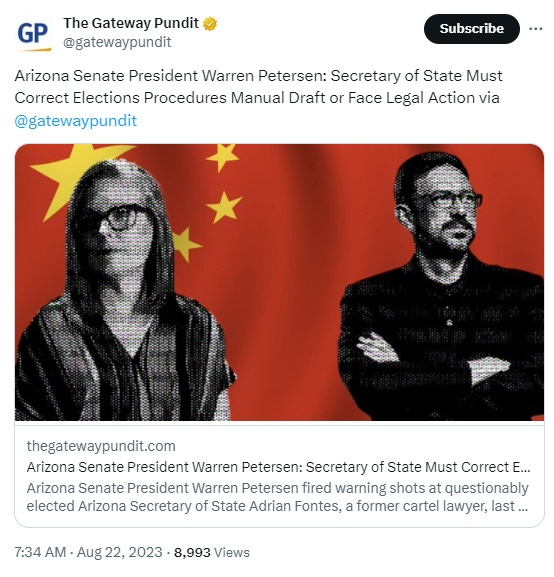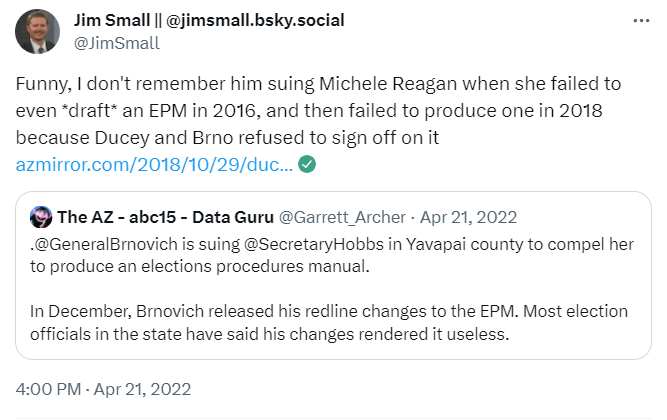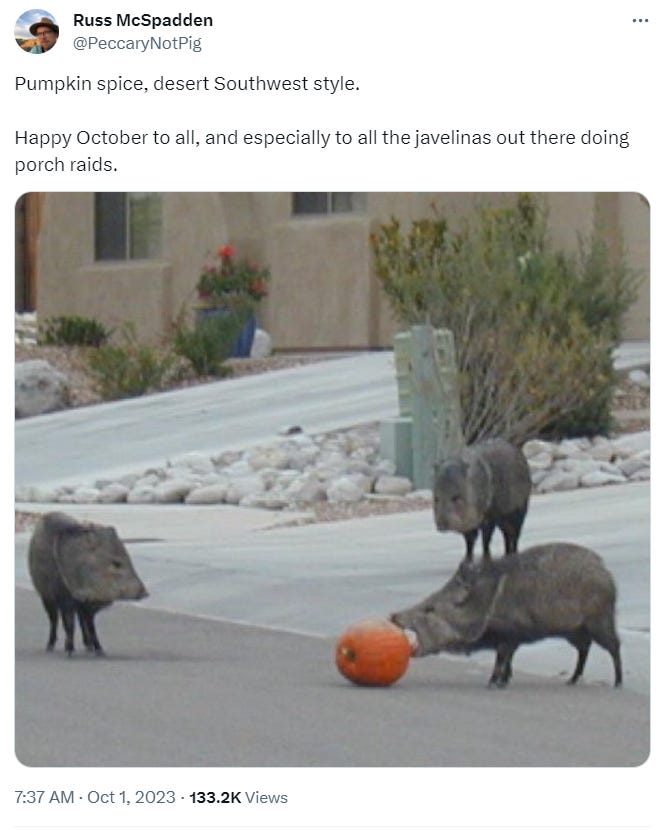The Daily Agenda: Breaking Reagan's Curse?
The Elections Procedures Manual strikes again ... Toxic workplace alert Part 2 ... And Harley is back.
Secretary of State Adrian Fontes submitted the final version of his first Elections Procedures Manual to the governor and attorney general on Saturday evening, pushing right up to the October 1 deadline.
The EPM is an incredibly geeky and powerful 250-page document that fills in the gaps in election law. If the law says elections officials must verify signatures on mail-in ballots, for example, the EPM explains which documents they can compare the signature against.
The secretary of state drafts the EPM, and the governor and attorney general must sign off. It used to be no big deal.
But for the past decade, drafting the EPM has been one of the most contentious jobs the state’s chief elections official faces.
Although the document is supposed to be updated ahead of every statewide election, it has only been successfully updated once since the 2014 election.
We call it the curse of Michele Reagan.
The Curse of Michele Reagan
Or the backstory of how the EPM got so contentious…
It all started back in 2015, when then-Secretary of State Michele Reagan didn’t draft a new EPM in anticipation of the 2016 election, saying she thought it was optional.
It was the first time in decades, at least, that the state didn’t have a new manual ahead of a statewide election. And it came just as Reagan’s office had successfully pushed a massive overhaul of the state’s campaign finance laws through the Legislature that year. Needless to say, county recorders were pretty upset.
Reagan finally did propose a new EPM for the 2018 election, but Gov. Doug Ducey rejected it. The document wasn’t updated for her entire tenure.
When Katie Hobbs became secretary of state in 2019, she drafted a new manual. Ducey and Attorney General Mark Brnovich signed off, and Arizona had a new EPM for the first time since 2014.
It looked like Reagan’s curse had been lifted.
But then in April 2022, Brnovich sued Hobbs over her latest EPM. Brnovich eventually lost the case, but his lawsuit ensured that the 2019 version was still in effect for the 2022 election and that Reagan’s curse carried on.
Anyway, now it’s Fontes’ turn to attempt to write an EPM that can gain approval from the governor and the AG and break Reagan’s curse once and for all.
His initial draft, delivered last month, garnered some amount of outrage from both sides. Election integrity activists complained that it would make it too easy for noncitizens to vote. Voting rights activists complained that it walked back many of the provisions Hobbs had fought for in 2021.
Fontes’ office received hundreds of comments from citizens and organizations seeking changes before the final draft, some of which Fontes made and some he did not, per our quick Sunday review.
Did change
The new version removes a footnote stating a law that will knock people off the Active Early Voting List if they don’t vote often enough will start in 2026. Republican lawmakers requested the change, saying the law would take effect in 2024.
The new version adds a footnote to a section about what documents can be used to verify voter signatures, warning that the question is the subject of an ongoing lawsuit (which Fontes is so far losing), another thing Republican lawmakers wanted.
The new version specifies that voting registration forms are free, something voting rights advocates sought to add.
The new version removes a line saying if a person challenges a voter’s right to vote, they may not speak to them “to prevent harassment and intimidation of the challenged voter.” Republican lawmakers sought that change.
The new version also removes a line stating “federal-only” voters cannot vote in presidential elections.
Did not change
The document still states that counties cannot conduct a full hand recount of all election results.
It still states that police departments should not be used as polling places, despite complaints from conservatives.
And it didn’t make any of the changes voting rights groups wanted about informing incarcerated people of their rights to vote.
Voting rights groups we contacted this weekend hadn’t had a chance to go through it line-by-line, but it’s safe to say they still want changes.
“We look forward to advocating with the Attorney General’s Office and Governor’s Office to make additional improvements for the benefit of Arizona voters,” All Voting Is Local’s Alex Gulotta said via text Sunday, sending a bullet point list containing dozens of the group’s unmet priorities.
The big question is after years of fighting her own EPM battles, is Hobbs ready for yet another fight, this time with a fellow Democrat?
Déjà vu: Substacker Beau Hodai at Cochise Regional News landed an interview with already-former county elections director /skeptic Bob Bartelsmeyer, who said he quit after just a few weeks on the job because it’s a “toxic environment.” That’s exactly what the former elections director said when she quit. Bartelsmeyer said the two Republican county supervisors attacked him at a board meeting, had nonsensical ideas of how to run elections and didn’t stick up for him when he received threats.
"This is a toxic environment. I have to think about my health and stress," Bartelsmeyer told Hodai.
Like a lot of us: Washington Post columnist Jack Stripling is wondering why ASU’s First Amendment Clinic is defending Kari Lake in the defamation case that Maricopa County Recorder Stephen Richer filed against her. The piece didn’t contain any insightful answer, other than it’s a First Amendment case, but the quote from Michael Crow (who now earns more than $1 million per year, after his new raise) makes it worth reading.
Insightful insights: In other stories that don’t answer their own headlines, the Republic’s Ron Hansen asks if Kari Lake can actually win the U.S. Senate seat and comes up with “it’s a big question mark.”
“One Arizona political operative said her support could depend on polling in the race after Arizona’s August primary,” Hansen writes.
Educating them with guns: Pinal County Sheriff Mark Lamb has been spending money meant to help prisoners on guns instead, the Arizona Luminaria’s John Washington reports. Lawmakers designated the fund “for the education and welfare of inmates” but Lamb has spent more than $200,000 on guns, ammo and bulletproof vests, and just $50,000 on books, Washington found. Advocates say that clearly breaks the law.
The Agenda costs way less than a new gun and it’s far more educational. Subscribe today!
That don’t fly in Payson: The Arizona School Boards Association is “too woke” for the Payson School District, which is considering dropping out of the lobbying and training organization, the Payson Roundup’s Peter Aleshire reports. The group has generally lobbied against school culture war bills.
Write your own budget: Hobbs asked regents to ask her for more money for Arizona’s university system, the Republic’s Sasha Hupka writes. Specifically, she wants the universities to write their own state funding formula, much like K-12 education is funded, rather than relying on annual legislative appropriations.
Your money is no good here: The Arizona State Retirement System is getting out of the Middle Eastern alfalfa business. Capitol scribe Howie Fischer reports that ASRS is divesting from a United Arab Emirates company1 that pumps water to grow alfalfa to feed cows half-a-wold away.
The most Steve Farley scandal ever: Former lawmaker, gubernatorial candidate and Tucson mayoral candidate Steve Farley has been suspended from his role as leader of the Southern Arizona Humane Society, Arizona Public Media’s Danyelle Khmara reports. The ouster comes after a pack of protesters showed up to demonstrate last week, demanding answers to what happened to about 250 small mammals that he says were transferred to a private rescue. Internet sleuths figured out where the animals went, and the private rescue is also connected to a snake feed business.
It’s already campaign season. We know because the governor’s dog is sliding into our DMs to help her fundraise again.
CORRECTION: A previous version of this report incorrectly stated that the Arizona State Retirement System had divested from Fondomonte, the Saudi Arabian company farming alfalfa in northwest Arizona. In fact, it divested from a company that owns another alfalfa farm in northwestern Arizona — this one ships to the United Arab Emirates.












